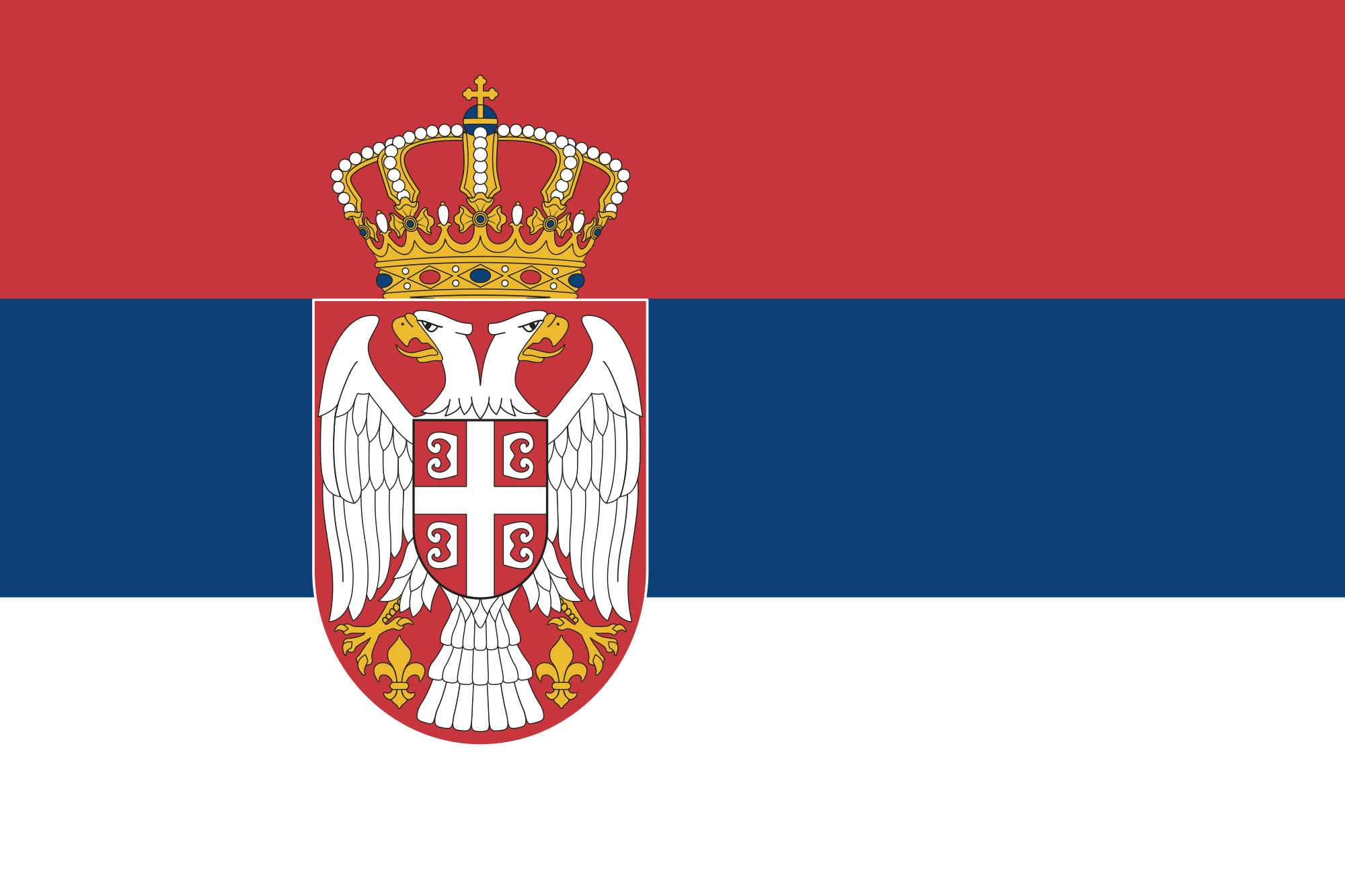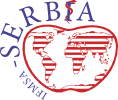Facts about Serbia
Exchange in Serbia
Fast Facts
- Name of State: Republic of Serbia
- Location: Central and Southeastern Europe.
- Capital: Belgrade.
- Currency: Serbian Dinar (RSD) – How many RSD is 1 EUR?
- Language: Serbian
- Calling Code: +381
- Major Airports: Belgrade Nikola Tesla Airport (BEG) and Niš Constantine the Great Airport (INI)
- Time zone: central European, CET (GMT + 1 hour) — — Time and Date converter
- Electricity: 220 ~ 230V, 50 Hz
- Water from public mains: Safe to drink
- Map of Serbia – Click here!
- National Internet domain: .rs
- National vehicle code: SRB
- Population (excluding Kosovo and Metohija): 7,132,578 (2015), 83% Serbs
- Official language: Serbian
- Official script: Cyrillic
- Religion: Orthodox Christianity (84.59%), Roman Catholicism (4.97%), Islam (3.1%) and others
More information at Wikipedia: https://en.wikipedia.org/wiki/Serbia

Officially known as the Republic of Serbia, the country is located in the central and southeastern part of Europe. It covers the central part of the Balkans and the southern part of the Pannonian Plain, which make the must see Serbia places exceptionally diverse as far as natural wonders are concerned. Situated amidst Bulgaria and Romania to its east, Hungary to its north, Montenegro, Herzegovina, Bosnia and Croatia to its west and Albania and the Republic of Macedonia to its south, the country welcomes you to a world with wonderful panoramic scenery, cultural and historical monuments, fishing areas, hunting grounds and curative spas. Furthermore, if you are visiting the must see places in Serbia don’t forget to hop in to the hunting grounds of the country that are awesome for any traveler.
‘Wondrous’ is the word that best describes Serbia. If you are tired of exploring the typical flora and fauna of the forests, the tranquil countrysides then the must see places in Serbia are spots you should consider visiting. The traditional touch of the cities added to the lustful party nights make Serbia an amazing mixture of modernism and ethnicity. To discover the quintessential Serbian aura, visit the capital city Belgrade to figure out the profound beauty of the architectures in this city. If you have plans to visit this city, don’t miss the beautiful Cathedral of Saint Sava, one of the most renowned orthodox churches in the country. Other than the spectacular semblance of this church, you can even wander around the lush green lawns and gaze at the architectural marvels around it.
If you are true art lover, then the country has various artistic relics as well. The Visoki Decani is one such example that has earned the designation as a UNESCO World Heritage Site in Serbia. The plethora of paintings made by distinguished artists from different parts of the world, Visoki Decani in the region of Kosovo and Metohija is known for paintings like Lord Christ carrying the cross, the House of Nemanjesic and the Marriage at Cana. Apart from this, the Mileseva Monastery and the Studenica Monastery are notable must see places in Serbia. Of the two, the grandeur and beauty of the later is worthy to be admired and deserves a visit. Being a World Heritage Site, the Studenica Monastery stores beautiful paintings on the Crucification and the King’s Church Model. To further fathom the complex art, craft and culture of Serbia, save some time to study the art works in the Museum of Contemporary Art at Novi Beograd. Romania.
The actual charm of Serbia can be only grasped when you visit the suburbs of the country and walk closer to nature. The enchanting terrains of the Stara Planina, also known as the Balkan Mountain Range is like a neverland from fairytale. The gruesome gorges and the dramatic passes have a different attractiveness of their own. Don’t forget to click a picture or two, when you see the Rish Pass, the Beklemeto Pass and the Luda kamchiya Gorge. A notable must see Serbia destinations, Stara Planina gets further romantic because of the green forests of the Shipka Peak, the Balgarka Peak and the Vezhaen Peak behind it. You can even take a tour to the pristine forests of the Rara Mountains, the Vrsac Mountains and the majestic Sar Mountains in the Balkans. The pellucid lake waters of the Lake Ludas is what you should never miss.
Weather
Serbia has a varied climate as the northern part of the country has continental climate with hot & humid summers and cold winters, whereas the southern part experiences Adriatic climate with hot & dry summers and autumns and relatively cold winters with heavy snowfall.
Weather forecast for the next period – click here!
Transportation
Air: Belgrade Nikola Tesla Airport (BEG) is the main airport of Serbia where flights from all the major European airlines come down regularly. You can also fly down to other airports like Niš Constantine the Great Airport (INI) and Priština International Airport (PRN).
Train: A number of trains are available from several international destinations to Serbia. You can reach Serbia from various places like Budapest, Vienna, Sofia and Bucarest. You can also arrive from Macedonia, Bulgaria. For Serbian Railways click here!
Bus: Buses and mini buses are available from Vienna and Hungary. You can also travel to various destinations within the country by bus.
List of must see places in Serbia:
- Belgrade
- Cathedral of Saint Sava
- The Visoki Decani in the region of Kosovo and Metohija
- Mileseva Monastery
- Studenica Monastery
- Museum of Contemporary Art at Novi Beograd
- Stara Planina
- Rara Mountains
- Vrsac Mountains
- Sar Mountains
- Lake Ludas
More about Serbia at www.serbia.travel
Source: http://www.youmustsee.com/europe/serbia/
Health advisory
WATER AND FOOD
The public water supply in Serbian towns and cities is safe and palatable. There are a great number of brands of bottled water, both still and sparkling, widely sold at affordable prices. Water from public fountains is also safe to drink, unless there is a specific warning that it is not suitable for drinking.
Milk and dairy products are produced to European standards. Fruit and vegetables are safe to consume with standard washing before use. In general, as in every other European country, all food and drink bought at regular points of sale is safe to consume.
HEALTHCARE
Vaccinations against infectious diseases are not necessary. Normal hygiene practices are enough to ensure a safe stay in Serbia. There are hospitals and clinics in all large towns and cities and there are medical surgeries in smaller towns.
Foreign nationals, as well as Serbian nationals who live and work abroad, are entitled to urgent medical assistance for the duration of their stay in Serbia. Citizens of countries with which an international health insurance treaty has been signed are entitled to urgent medical assistance in Serbia on the basis of a certificate of health insurance held. They are entitled to urgent medical assistance by filling in the necessary forms (if these are required) or on the basis of a document proving that they are insured in their home country.
Citizens of Slovakia, Poland, Bulgaria and Great Britain are entitled to urgent medical assistance on the basis of a document proving that they have health insurance in their own country. The citizens of the following countries are entitled to urgent healthcare on the basis of a prescribed form: Austria, Belgium, Bosnia and Herzegovina, Croatia, Czech Republic, France, Germany, Hungary, Italy, Luxembourg, Macedonia, Montenegro, Netherlands and Romania. Citizens of the aforementioned countries not having the required confirmation with them may still receive urgent medical assistance with confirmation requested from their own insurer at a later date. Foreign nationals with chronic or acute conditions (on dialysis, insulin etc.) need special certificates in order for them to receive such health services free of charge in Serbia.
Citizens of countries with which Serbia has not signed an international health insurance treaty pay for emergency medical assistance received during their temporary stay in Serbia. Any costs incurred may be reimbursed by their own insurance company on return to their home country.
EMERGENCIES
The Emergency Ambulance Service can be reached by calling 194 and is available 24 hours a day.
In larger towns and cities there are also 24-hour dental surgeries, as well as 24-hour health institutions for all kinds of urgent conditions or injuries.
Selected pharmacies are also open 24 hours, although some medicines require a doctor’s prescription.
Emergency numbers:
Police – 192
Fire – 193
Ambulance – 194
European emergency nomber – 112
INFO
Ministry of Health
Nemanjina 22–26, 11000 Belgrade
tel. ++381 (0)11 3613-734
Ministry of Foreign Affairs
Kneza Miloša 24-26, 11000 Belgrade , Republic of Serbia
Phone: (+381 – 11) 3616-333
(+381 – 11) 3068-000
Fax: (+381 – 11) 3618-366
Е-mail: mfa@mfa.rs
